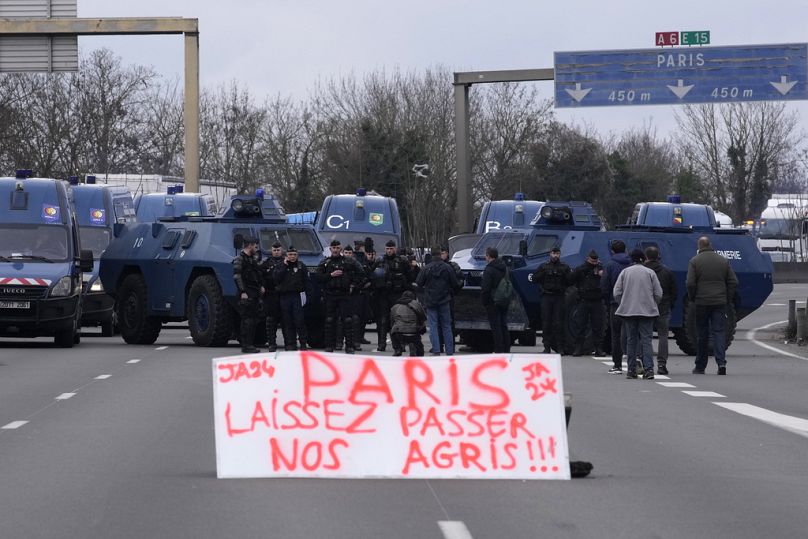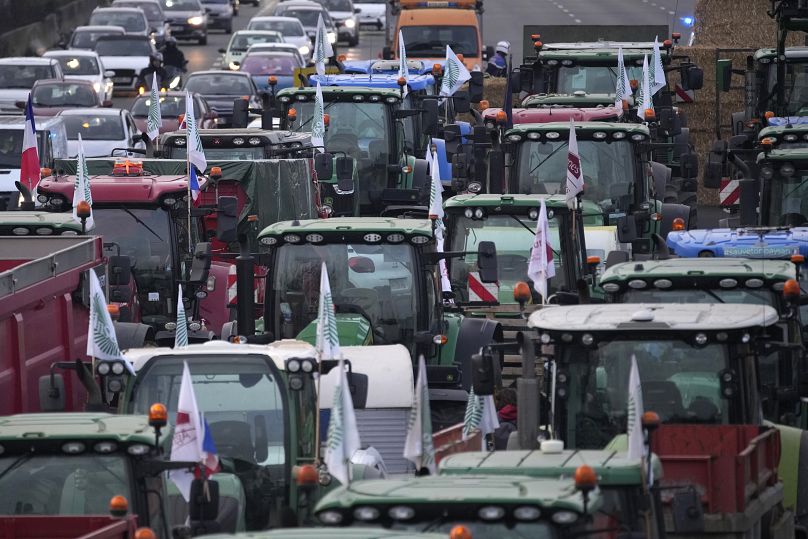Unfair competition from imports and fair pay are two of the issues farmers are protesting over.
Convoys of tractors are edging closer to Paris, Lyon and other major French cities with police arresting 18 people just outside the capital city on Wednesday. Last week, a woman and her teenage daughter died in southern France after a car hit a roadblock where they were standing.
Tensions are rapidly rising and the president of France’s biggest farming union FNSEA, Arnaud Rosseau, called for “calm and reason” in the face of growing anger. He acknowledged that many European issues cannot be “resolved in three days.”
France has scrambled to offer concessions with new Prime Minister Gabriel Attal saying on Tuesday that he was ready to solve the crisis.
But despite officials meeting with farmers, protests are spreading across Europe.
How is France trying to make peace with farmers?
Prime Minister Attal told lawmakers at France’s National Assembly on Tuesday that he was ready to resolve the crisis, adding that “there is and there must be a French agricultural exception”.
He said he would put in place controls on imported food that would ensure “fair competition”. Especially, he added, when it comes to regulations being applied equally to both French farmers and imported products.
One of the farmers’ key grievances has been a trade deal between the EU and Mercosur - a South American bloc which is made up of Argentina, Brazil, Uruguay and Paraguay. They worry that they won’t be able to compete with cheap imports of agricultural goods that don’t have to conform to the same regulatory standards.
The trade deal has been in talks for more than two decades and an agreement was announced in 2019. But it was never implemented due to new environmental demands from the EU including assurances on deforestation and climate change.
France has long been opposed to the deal with President Emmanuel Macron saying in the past that he can’t impose environmental regulations on farmers within France while imports of agricultural goods from elsewhere don’t have to uphold the same standards.
Environmental groups too have opposed the deal calling into question the climate impact of importing more products like beef from the Mercosur bloc.
The French government said on Tuesday that EU talks with Mercosur have now stopped after President Emmanuel Macron convinced them to bury the deal. It claims that the Commission recognised that it was impossible to conclude them in current circumstances.
The Commission, however, says that negotiations are still in progress.
Prime Minister Attal addressed concerns about fair pay too, saying a law meant to ensure farmers receive their fair share of profits from retailers will be better enforced. Checks are now being carried out and retailers who aren’t following the rules will be fined, starting immediately. The Prime Minister also promised emergency aid for struggling wine producers.
A cut in taxes on agricultural fuel used in tractors and other farm machinery and pledges to cut environmental red tape were already offered last week to appease France’s farmers.
Despite this, protesters continue to move closer to major cities like Paris and Lyon, blocking roads and causing heavy traffic jams. Many, including FNSEA, remain sceptical about the government’s ability to address their demands.
EU delays rules on leaving land for nature
Farmers have just won their first concession from the EU as rules on setting aside land to restore soil and increase biodiversity are set to be delayed.
These rules mean farmers would have to leave between 4 and 7 per cent of land unused or fallow so that nature can recover as a requirement for receiving EU subsidies.
A new proposal from the European Commission on Wednesday has now recommended a delay in introducing these rules on fallow land until 2025.
“The commission’s proposal, sent today to member states who will vote on it in a committee meeting, provides a first concrete policy response to address farmers’ income concerns,” it said in a statement.
“It also follows requests outlined by several member states in agriculture council meetings.”
Maroš Šefčovič, European Commission executive vice president responsible for the European Green Deal, said the decision to delay the rules was taken as farmers had had an exceptionally hard year due to climate change and extreme weather.
“I met with the president of Andalusia, he was telling me that the water reservoirs are at 20 per cent level or in some parts of Andalusia 4 per cent,” he told a press briefing.
“What kind of dramatic changes does that require to sustain the agriculture and economic model? What kind of percentages are lost in the GDP?”
Farmers in Greece, he said, had lost more than 20 per cent of their annual revenue due to fires and floods.













